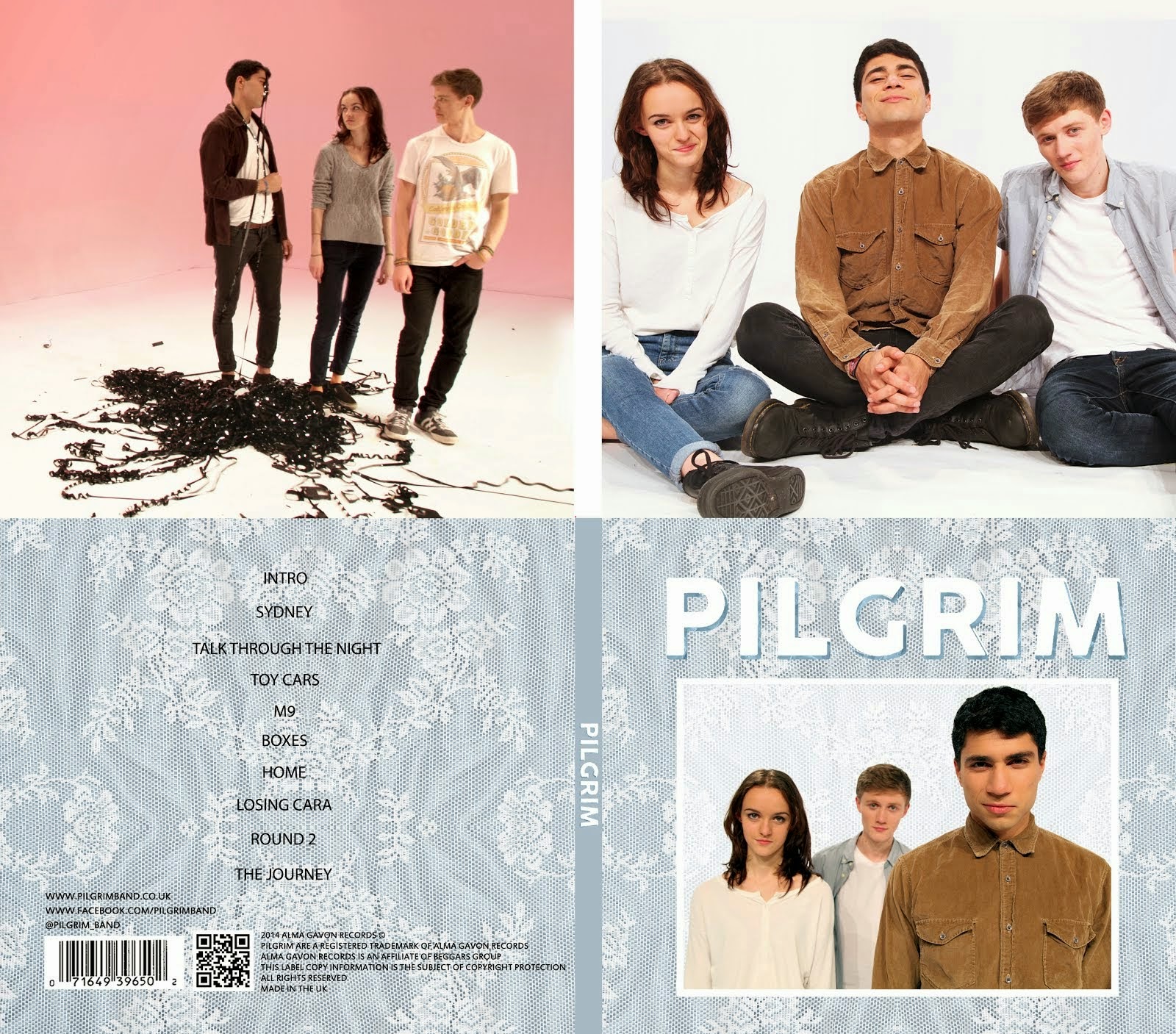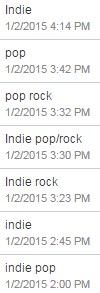Audience Profiles
We had three audiences that we were trying to target. The main thing that they all had in common is that they are all fans of music to some degree. We then narrowed down our primary, secondary and tertiary audiences by targeting specific age groups and looking at the kind of music that they listen to.
Primary Audience - Indie fans of all ages
...
Why we chose this as our primary audience
Music consumption
As this is quite a broad target audience, they consume music in many different ways. The younger fans consume music in more non-traditional ways such as digital downloads or streaming to mobile devices. Older audiences tend to prefer more traditional methods such as CDs or vinyl. However, there are plenty of younger fans that prefer more traditional methods and plenty of older fans that prefer digital methods of consumption.
Engagement with artists
Most indie fans go to gigs to see the artist perform and hear the music live. Fans who prefer non-traditional methods of consumption follow artists on various social media sites and enjoy engaging in discourse with other fans. Richard Dyer's star theory says that fans buy into the image of the artist or band and that interaction via social media is an important part of being a fan. David Gauntlett also talks about artist identity in the modern world and how constructing an identity is a required for success. Artists construct this image through social media sites and fans engage with them.
Secondary Audience - UK 16-24 year olds
...
Why we chose this as our secondary audience
Our secondary audience is more specific. Since Pilgrim is a British band, we targeted British people specifically. The Youtube analytics for our video show that the majority of the views are from British people. We chose 16-24 year olds because indie music is popular among this age group. Many fans of pop music are actually indie fans without realising it. Many people who listen to artists like Katy Perry or Rihanna would not identify as an indie fan despite also listening to indie pop artists like Ed Sheeran or The 1975.
Music consumption
This audience is part of the web 2.0 generation and frequently uses technologically converged devices like smartphones of laptops. Streaming and illegal downloading is very common amongst this age group. Most 16-24 year olds are very active on social media sites and use them regularly to socialise and follow their favourite artists.
Despite the decline of CD sales (19.6% in the second half of 2014), vinyl has grown massively in popularity, fuelled by albums like AM and Lazaretto by Arctic Monkeys and Jack White respectively.
These music fans also like to meet their idols at live shows or meet-and-greets. This fanboy/fangirl culture is most common among this age group.
Tertiary Audience - Music fans of any genre/age
...
Our tertiary audience is very broad. We feel that our band has quite a broad appeal and fans of an age or genre will be able to relate to the video's universal themes of childhood and friendship to some degree or, at the very least, enjoy the song.
Appealing To Our Audience
Stuart Hall suggested that, as different audiences have different cultural backgrounds, they can interpret a text in different ways. As our video is quite conceptual, we have given the viewer a chance to infer their own meaning from the song. Therefore, while we have not directly chosen to amplify the meaning of the song, some audience members may deduce their own amplified meaning from the video. Getting feedback is very important because, as Stuart Hall said, everyone interprets things differently and getting the opinions of other people helped us see things that we hadn't considered.
Feedback throughout the project
Throughout the project, we collected feedback from our friends and classmates, many of whom were indie fans and, therefore, members of our primary target demographic. We asked them various things such as their opinions on various shots or on the video as a whole, as well as getting opinions on different publicity shots and aspects of the website.
Getting outside opinions on the project was really useful because we saw the artefacts differently from how others did since we were working on them so much. We found that other people often had very different opinions to us on different things and that we often found flaws that our target audience didn't even notice. For example, Mahalia thought that Alice looked very sad in the shot below. However, when we asked other people what they thought of the shot, they thought it worked well with the sequence and suited the slow part of the song.
Another shot that we were unsure about was the shot below from our first cut. Mahalia didn't like the motion of the shot and thought it was offputting but I liked it and wanted to keep it.
After asking members of our target demographic, we found that others also thought the shot didn't work, saying the motion was unnatural and distracting. We replaced it with the following shot.
After asking members of our target demographic, we found that others also thought the shot didn't work, saying the motion was unnatural and distracting. We replaced it with the following shot.
When designing our album cover, we wanted to portray the band as fun and approachable. We chose the image below because we felt that it conveyed the band's playful mood well and was an interesting shot.
However, when we showed it to members of our target demographics, the most common response was that the image wasn't serious enough and that the band members weren't coming across as a band as much as just three friends. We chose a more serious picture and asked people again what they thought. The feedback was much more positive.
On our website, we have a competition page with a large image on it showing the prizes and how to win. Our initial image was received negatively when we showed it to people. They said that the 'WIN!' box in the bottom left corner was too large and that the Pilgrim logo was too small. The gif below shows the changes I made after receiving this feedback.
Feedback on the final artefacts
Music Video
We managed to get responses from a range of participants. The majority of the respondents were aged 16-24 but we did also get some responses from older people. We got roughly the same number of reponses from males and females, meaning our responses weren't skewed due to gender imbalance.
I created a survey using a website called SurveyMonkey, asking for feedback on our music video. I have embedded the survey below. This website was very useful because we managed to collect lots of results from members of our different target audiences.
I also asked people to choose which target audience demographic they fit into so that we could easily identify the kinds of responses we got from each of our target audiences. We got a good spread here too, with the majority of respondents being members of our primary target audience, (indie fans), and multiple responses from the other categories.
1. People enjoyed the video and thought it went well with the song
Participants gave very positive ratings for the video and most thought it suited the song well. Since almost everyone that took the survey was a member of one of our target demographics, this shows that we effectively appealed to them when making the video.
(note: both questions were out of 5, despite the scale going to 10)
2. The viewers understood that the video was from the indie genre
Respondents almost unanymously thought that the genre was indie or some sub-genre of the indie genre, (indie-pop was also a fairly popular response). This shows that we clearly conveyed the genre, following its conventions effectively.
(Responses to question 5)
3. We successfully conveyed the themes that we had intended it to
One of the questions asked what themes the video conveyed. Popular answers included friendship and youth. These are all themes that we intended to communicate. Having fun was another popular answer. This was not a theme that we directly tried to communicate but it is definitely strongly related to the other themes that we intended to convey. Overall, the results show that we communicated the themes of the song well.
(Responses to question 9)
4. People responded positively to the band's branding and said they would buy into them
I included two questions related to this. One asked participants if they would buy the band's music after watching the video and the other asked how much they would be willing to pay to see the band live. Over 80% of the respondents said they would either buy or consider buying Pilgrim's music and roughly 85% said they would see them live. The most popular range for this was £10 to £19. This is a fairly typical price for seeing an indie band live.
The fact that most respondents said they would at least consider buying into the band in some way shows that we created a distinct and desirable image for them.
Many repondents said they liked how colourful the video was. Some said that they liked the camerawork and said it looked quite professional. We did receive plenty of negative feedback too. Many noted the lack of narrative. We decided not to have a narrative but, since it is conventional of indie videos to have some kind of narrative, some people may have felt that it was needed.
| Respondents liked the use of colour |
| Some people thought the video lacked a narrative |
 |
| Some other opinions |
Digipak and Website
Three Main Lessons Learned
We learned a lot from audience feedback that we collected throughout the project. In summary, the three most important things that I learned were:
- We managed to successfully appeal to our target audiences. In particular, we appealed to 16-24 year olds as they are the most tech-savvy and they were comfortable using our website while older people thought it was too cluttered and confusing.
- Different audience members interpreted our texts in different ways. As Stuart Hall said, media texts are decoded differently depending on who is interpreting the text. Throughout the project, feedback varied between people of different backgrounds and ages and we got lots of different opinions at all stages of the project. I had not anticipated how varied the opinions of our texts would be.
- We successfully created artefacts that are identifiable as part of the indie genre. Across all of our feedback, one consistent opinion was that the three artefacts were distinctly indie. I think that we did a good job of making the artefacts conform to conventions of the indie genre and they all fit into the genre well. Some people did think the music video was from the pop genre. This may be due to the fact that we unintentionally drew some influence from pop music videos, where bright colours are very conventional. However, these influences didn't dominate the video and it is still distinctly indie.




















No comments:
Post a Comment